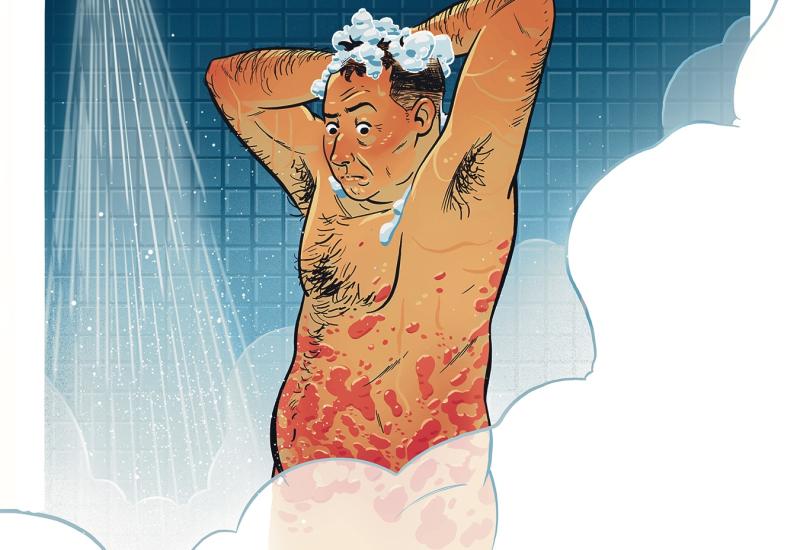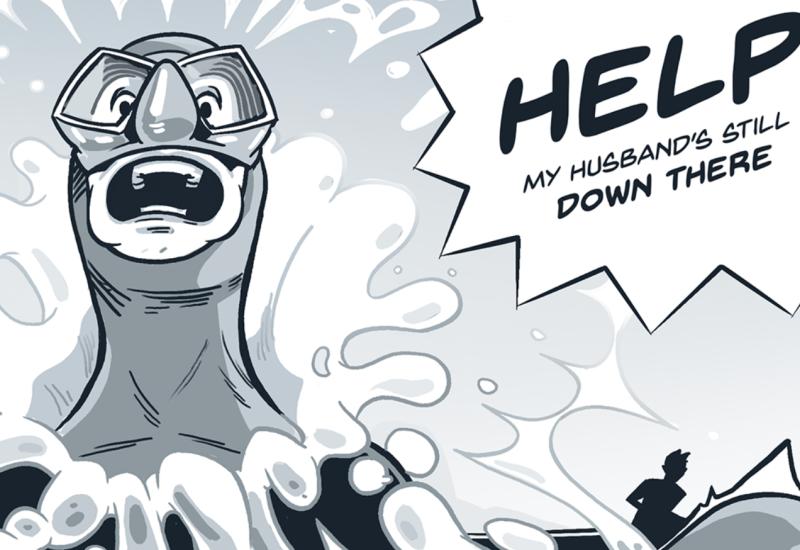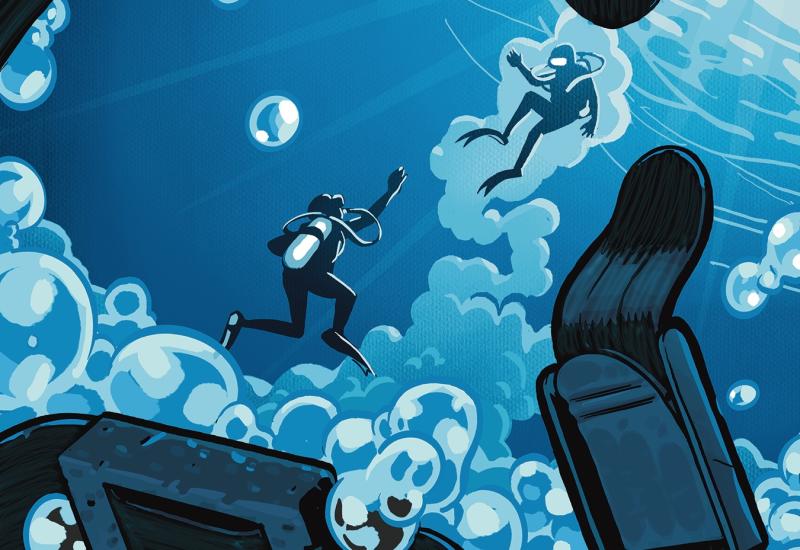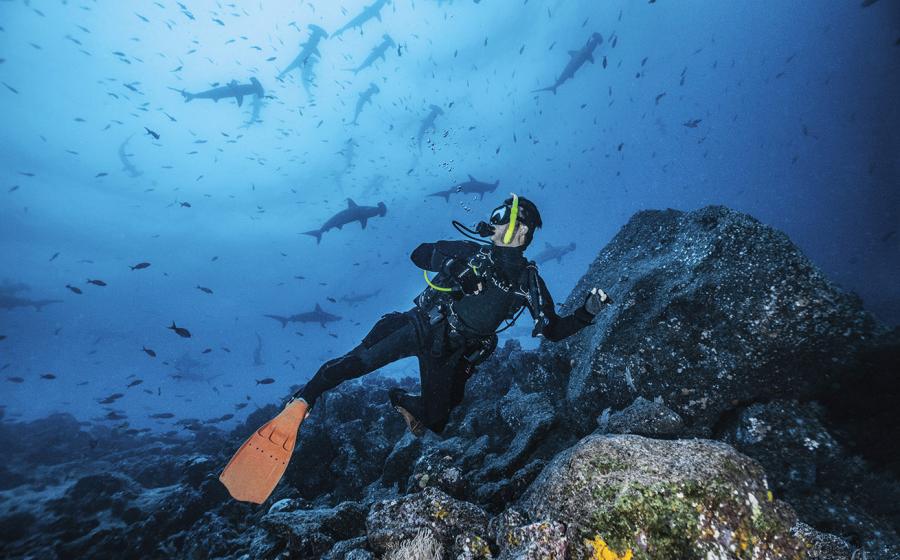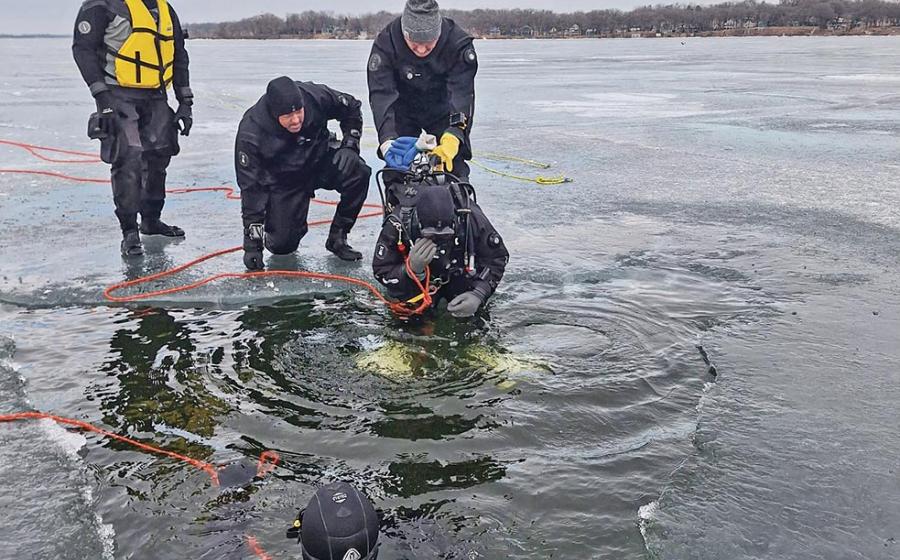Switching Tanks

Photograph by Stephen Frink
John thought he'd seen it all until the day he encountered Ron descending the anchor line holding an extra tank in his hands. There was no regulator attached to the spare tank, nor was the tank attached to Ron's gear, leading John to assume that it had somehow fallen off the boat. John offered to take it and return it to the surface, but Ron just gave him a friendly wave and swam off toward the reef. Deciding that there must be some logical explanation, John shrugged and continued on with his dive. When he encountered his friend again some 15 minutes later, he couldn't believe his eyes. There was Ron-65 feet beneath the surface, struggling to attach his BC and regulator to the spare tank.
The Divers
John was an experienced instructor and a frequent dive traveler. Ron, a former student of John's dive shop, was a relatively experienced diver with advanced open-water certification. Both men were part of a group live-aboard trip in the Pacific.
The Dive
The seas were relatively calm and overall conditions were excellent. Ron's equipment, however, was not in excellent shape. A leaking alternate air source had rapidly drained his tank, forcing him to cut short his first dive of the day. In fact, he lost so much air that he was looking for creative solutions to get more bottom time. The crewmember overseeing the dive platform was amused when Ron asked if he could carry a spare tank on the dive. Certain that Ron was joking, he decided to play along and responded, "Sure, take all the tanks you want." Moments later, he was stunned to see Ron enter the water and quickly descend with the spare aluminum 80-no regulator or BC attached-in his hands. Thinking Ron was just playing out the joke, the crewmember decided not to retrieve the tank from the diver who was already halfway to the bottom.
The Accident
Ron descended to about 65 feet where he enjoyed a brief 15 minutes of diving before running dangerously low on air. Enacting his "plan," he located a sandy spot on the bottom, switched to a Spare Air device and started changing out tanks. A Spare Air is designed to provide enough air to allow a diver to make an immediate ascent to the surface. It is not designed to allow a diver to kneel on the bottom at three atmospheres of pressure and breathe for several minutes while repairing equipment. This was a lesson that Ron learned the hard way when he exhausted the unit before reassembling his gear.
The Rescue
Fortunately for Ron, the charter vessel had a divemaster in the water, and although Ron had separated from the group, the crewmember saw what was happening from a distance. He approached Ron just as he exhausted the Spare Air and began to panic. The divemaster immediately offered his alternate air source, then transported the diver and his dangling load of equipment to the surface.
Analysis
As is often the case with dive accidents, things went wrong long before the diver entered the water. Ron should have never attempted a dive with a leaking octopus, and certainly not with one leaking badly enough to appreciably shorten the dive. It is unclear why he didn't seek the crew's help to fix or replace the malfunctioning regulator-the safest course of action.
Although it is easy to understand how the crewmember on deck took Ron's comment to be a bizarre joke, he should not have. As a diving supervisor, you should never assume that any question or any comment, no matter how bizarre, is not serious until it is proven to be a joke. The crewmember clearly should have stopped Ron from entering the water with the additional tank.
Changing out cylinders under water is obviously a very dangerous stunt, not to mention bad for your equipment. In order to change the cylinders, Ron had no choice but to cut off his primary air supply for several minutes. Even if he could have accomplished that task without drowning, he would have forced salt water through the entire air delivery system. This would lead to either the need for a complete internal cleaning and servicing of the equipment (best case) or total system failure.
Finally, Ron relied on a Spare Air during the several minutes it would take to remove his gear, remove the tank, install the new cylinder, reattach his regulator and purge the water from the system. Spare Air units are extremely effective safety devices, but only when they are used as intended-to make an immediate controlled ascent to the surface. At three atmospheres, or 66 feet, Ron was consuming his gas supply three times as quickly as at the surface. Add the accelerated breathing rate that comes with physical exertion and the stress of changing a cylinder under water, and running out of gas was a predictable outcome for Ron's plan. The only fortunate thing that happened to Ron was the quick action of the divemaster who stopped this disaster before it could unfold.
Lessons for Life
-
Service your gear following the manufacturer's recommended specifications.
-
If your gear fails before a dive, fix it or cancel the dive. Never attempt to compensate for improperly working equipment and never attempt to change your tank underwater.
-
Emergency ascent devices, like the Spare Air, are designed for just that, an emergency ascent; not for sustained use on the bottom.
-
Assume the worst if you are a dive supervisor. You should never assume that any question or comment, no matter how bizarre, is intended to be a joke.

Photograph by Stephen Frink
John thought he'd seen it all until the day he encountered Ron descending the anchor line holding an extra tank in his hands. There was no regulator attached to the spare tank, nor was the tank attached to Ron's gear, leading John to assume that it had somehow fallen off the boat. John offered to take it and return it to the surface, but Ron just gave him a friendly wave and swam off toward the reef. Deciding that there must be some logical explanation, John shrugged and continued on with his dive. When he encountered his friend again some 15 minutes later, he couldn't believe his eyes. There was Ron-65 feet beneath the surface, struggling to attach his BC and regulator to the spare tank.
The Divers
John was an experienced instructor and a frequent dive traveler. Ron, a former student of John's dive shop, was a relatively experienced diver with advanced open-water certification. Both men were part of a group live-aboard trip in the Pacific.
The Dive
The seas were relatively calm and overall conditions were excellent. Ron's equipment, however, was not in excellent shape. A leaking alternate air source had rapidly drained his tank, forcing him to cut short his first dive of the day. In fact, he lost so much air that he was looking for creative solutions to get more bottom time. The crewmember overseeing the dive platform was amused when Ron asked if he could carry a spare tank on the dive. Certain that Ron was joking, he decided to play along and responded, "Sure, take all the tanks you want." Moments later, he was stunned to see Ron enter the water and quickly descend with the spare aluminum 80-no regulator or BC attached-in his hands. Thinking Ron was just playing out the joke, the crewmember decided not to retrieve the tank from the diver who was already halfway to the bottom.
The Accident
Ron descended to about 65 feet where he enjoyed a brief 15 minutes of diving before running dangerously low on air. Enacting his "plan," he located a sandy spot on the bottom, switched to a Spare Air device and started changing out tanks. A Spare Air is designed to provide enough air to allow a diver to make an immediate ascent to the surface. It is not designed to allow a diver to kneel on the bottom at three atmospheres of pressure and breathe for several minutes while repairing equipment. This was a lesson that Ron learned the hard way when he exhausted the unit before reassembling his gear.
The Rescue
Fortunately for Ron, the charter vessel had a divemaster in the water, and although Ron had separated from the group, the crewmember saw what was happening from a distance. He approached Ron just as he exhausted the Spare Air and began to panic. The divemaster immediately offered his alternate air source, then transported the diver and his dangling load of equipment to the surface.
Analysis
As is often the case with dive accidents, things went wrong long before the diver entered the water. Ron should have never attempted a dive with a leaking octopus, and certainly not with one leaking badly enough to appreciably shorten the dive. It is unclear why he didn't seek the crew's help to fix or replace the malfunctioning regulator-the safest course of action.
Although it is easy to understand how the crewmember on deck took Ron's comment to be a bizarre joke, he should not have. As a diving supervisor, you should never assume that any question or any comment, no matter how bizarre, is not serious until it is proven to be a joke. The crewmember clearly should have stopped Ron from entering the water with the additional tank.
Changing out cylinders under water is obviously a very dangerous stunt, not to mention bad for your equipment. In order to change the cylinders, Ron had no choice but to cut off his primary air supply for several minutes. Even if he could have accomplished that task without drowning, he would have forced salt water through the entire air delivery system. This would lead to either the need for a complete internal cleaning and servicing of the equipment (best case) or total system failure.
Finally, Ron relied on a Spare Air during the several minutes it would take to remove his gear, remove the tank, install the new cylinder, reattach his regulator and purge the water from the system. Spare Air units are extremely effective safety devices, but only when they are used as intended-to make an immediate controlled ascent to the surface. At three atmospheres, or 66 feet, Ron was consuming his gas supply three times as quickly as at the surface. Add the accelerated breathing rate that comes with physical exertion and the stress of changing a cylinder under water, and running out of gas was a predictable outcome for Ron's plan. The only fortunate thing that happened to Ron was the quick action of the divemaster who stopped this disaster before it could unfold.
Lessons for Life
Service your gear following the manufacturer's recommended specifications.
If your gear fails before a dive, fix it or cancel the dive. Never attempt to compensate for improperly working equipment and never attempt to change your tank underwater.
Emergency ascent devices, like the Spare Air, are designed for just that, an emergency ascent; not for sustained use on the bottom.
Assume the worst if you are a dive supervisor. You should never assume that any question or comment, no matter how bizarre, is intended to be a joke.

